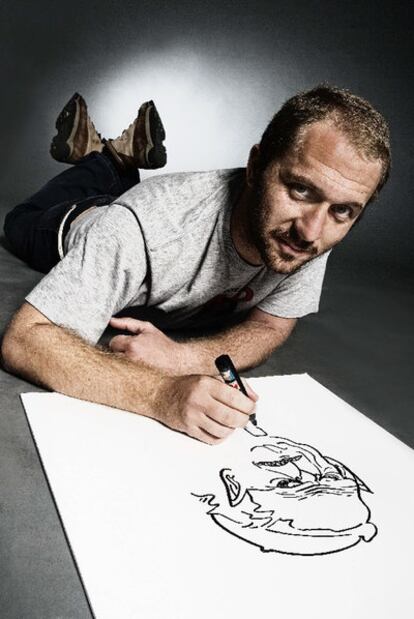The twists behind tabletop soccer
A controversial Italian author writes about the Spaniard who invented the game
Alejandro Campos was born in 1919 in Fisterra and spent his childhood in A Coruña. He led an adventurous life during which he was a tap dancer for Spanish-Argentinean diva Celia Gámez and was later wounded during the Nationalist bombardment of Madrid during the civil war.
He lived in exile in Guatemala, after escaping the Franco regime on foot through the Pyrenees, where he was kidnapped for his Republican sympathies. In Mexico he worked as a newspaper editor and founded the publishing house Editorial Finisterre Impresora.
Campos returned to Spain during the transition to democracy and acted as the executor for poet León Felipe's estate. He died in Zamora in 2007, having changed his name to Alejandro Finisterre, the Spanish name for the town of his birth, and despite his tumultuous existence is today best known for inventing tabletop soccer.
Alessio Spataro was born in Catania, Sicily's second-largest city, in 1977, and is one of the most renowned illustrators in a country with no shortage of scathing cartoonists or the inspiration to become one. These two worlds, which share neither geography nor epoch, come together in Biliardino, the forthcoming graphic novel penned by Spataro and based on his own life and that of Finisterre.
Spataro admits in interviews to being a passionate player of tabletop soccer and admits that he didn't know who its inventor was until he read Finisterre's obituary.
"The idea was born from my passion for the game and the differences between Finisterre's life and my own personal history. I have quite a privileged life, with job satisfaction and banal difficulties, and I couldn't help but be fascinated with a story like Finisterre's, which was so difficult and tragic."
Now living in Rome, Spataro gathered all the information he could on Finisterre, and contacted people that knew him, such as the writer Xurxo Souto and the director of the documentary Behind Tabletop Soccer, Bep Moll de la Fuente.
"They helped me a lot, although there were still some grey areas," Spataro says.
"There is an autobiography, but it is in the archives of a publisher's house. I tried to contact his widow, María Herrero, but I wasn't successful so could not verify some details about his return to Spain in the late 1970s."
Nevertheless, Spataro's script is complete as are some of the 300 red-and-blue bichrome presses that will make up the novel, due to be published in 2013.
Tabletop soccer, for Spataro, also has its contradictions; a rigid international official rulebook for a game that is played in bars, schools, and homes. "Anybody can play table soccer, like me, who always gets beaten in tournaments, and Finisterre, who himself claimed to have only lost a handful of games in Guatemala, in 1953, against Hilda Gaeda, Ernesto Guevara's first wife."
Biliardino, one of the Italian names for a game that has many in different regions and countries and the working title that Spataro says he will probably keep, is also a contradiction compared to his previous work, which attacked the Catholic Church (Pope Nazingher, 2008) and Georgia Meloni, the youngest and most loquacious of Silvio Berlusconi's ministers (La Ministronza and La Ministronza II, 2009 and 2010). The latter caused quite a stir in Italy, even in leftist circles.
"Of course it will be different from previous books," Spataro says. "But I'm not yet tired of saying what I think about the slimiest people in my country. And beyond who they are and what they do, the support they receive from politicians that should be combating them but who instead legitimize them sickens me most."

Tu suscripción se está usando en otro dispositivo
¿Quieres añadir otro usuario a tu suscripción?
Si continúas leyendo en este dispositivo, no se podrá leer en el otro.
FlechaTu suscripción se está usando en otro dispositivo y solo puedes acceder a EL PAÍS desde un dispositivo a la vez.
Si quieres compartir tu cuenta, cambia tu suscripción a la modalidad Premium, así podrás añadir otro usuario. Cada uno accederá con su propia cuenta de email, lo que os permitirá personalizar vuestra experiencia en EL PAÍS.
¿Tienes una suscripción de empresa? Accede aquí para contratar más cuentas.
En el caso de no saber quién está usando tu cuenta, te recomendamos cambiar tu contraseña aquí.
Si decides continuar compartiendo tu cuenta, este mensaje se mostrará en tu dispositivo y en el de la otra persona que está usando tu cuenta de forma indefinida, afectando a tu experiencia de lectura. Puedes consultar aquí los términos y condiciones de la suscripción digital.








































